Published: October 07, 2009; Bring Back the Caliphate.
By Soner Cagaptay,
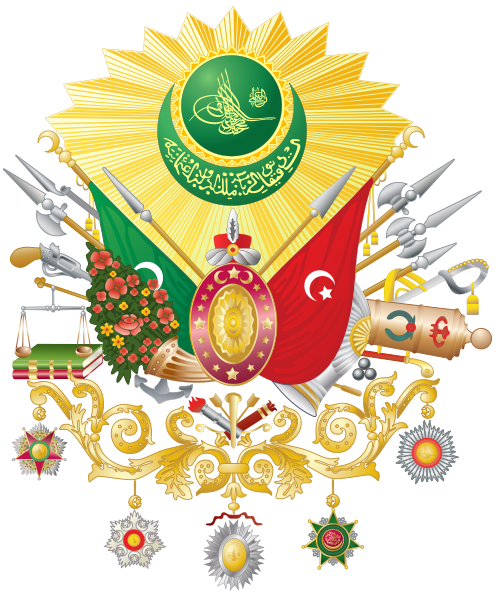
A typical military sign from the Ottoman Empire known as "arma" in Turkish army (infantry) and displayed on the reverse side of the battalion banners (military colours) of European style introduced after Nizami-Jedid reforms.
The reaction in Turkey to the recent death [september 23, 2009] of Ertugrul Osman, heir to the Ottoman throne and successor to the last Caliph, could not be more shocking. Islamists in kaftans and long beards gathered in Istanbul two weeks ago to bury the titular head of the world Muslim community, a scotch-drinking, classical music-listening Western Turk who until recently lived on New York City’s Upper East Side.
The Islamists’ embrace of Osman, a descendant of the westernized Ottoman sultans, provides a periscope into the Islamist mind: Islamism is not about religion or reality. Rather it is a myth and a subversion of reality intended to promote Islamism, a utopian ideology. Osman, raised by a line of West-leaning caliphs and sultans, loved Atatürk’s Turkey, yet the Islamists abused his funeral and the memory of the caliphate, changing it into a symbol for their anti-Western, anti-secular and anti-liberal agenda.
Were Ertugrul Osman alive and were the Ottomans around today, he would be Sultan Osman V and no doubt, he would be going after the fundamentalists who abused his funeral in an attempt to distort his legacy.
Despite what the Islamists want the world to believe, the Ottoman caliphate was not anti-Western. The Ottoman Empire always interacted with the West—an interaction that goes all the way back to 16th-century Sultan Suleyman the Magnificent, who envisioned himself as the Holy Roman emperor. In the 18th and 19th centuries, the Ottoman sultans and caliphs embarked on a program of intense reforms to remake the Ottoman Empire in the Western image to match up with European powers. To this end, the caliphs launched institutions of secular education, and paved the way for women’s emancipation by enrolling them in those schools. By the beginning of the 19th century, the sultans and caliphs of the Ottoman Empire embodied Western life and Western values. The last caliph, Abdulmecid Efendi, considered the Ottoman state a Western power with a Western destiny. An enlightened man and avid artist, the caliph’s sought-after paintings, including nudes, are on exhibition at various museums, such as Istanbul’s new museum of Modern Art.
It is therefore wrong to represent the Ottoman Empire as the antithesis to the secular republic Atatürk founded in 1923. True, when Atatürk turned Turkey into a secular republic in 1923 by abolishing the Ottoman state and the caliphate, Atatürk did not eradicate the sultan-caliphs’ legacy. Rather, he fulfilled their dream of making Turkey a full-fledged Western society. Atatürk’s reforms are a continuation of the late Ottoman Empire—he merely pursued Ottoman reforms to their logical conclusion.
Moreover, Atatürk was the product par excellence of the Ottoman Empire. He was raised in Salonika, the hub of cosmopolitanism and Western culture in the reforming empire. He studied in secular Ottoman schools, and he was trained in the Westernized Ottoman military.
The debate over the Ottoman caliphate’s legacy has ramifications not only for Turkey, but also for contemporary Muslims and the Western world’s desire to counter radical Islamists. Years before emergence of al Qaeda, the caliphs produced an antidote against radical jihadists, a progressive vision for a Western-oriented Muslim society. The sultan-caliphs built the institutional foundations of this society, including the first Ottoman parliament and constitution of 1876, and planted in it seeds of Western values, such as secular education and women’s emancipation. Modern Turkey owes its existence as much to Atatürk as to the sultan-caliphs who were among the first to promote liberal and Western values in a Muslim society.
Now, the Islamists want to usurp the caliphate and its legacy. The fundamentalists first distort the caliphate’s politics, reimagining it as an anti-Western institution. Then, they portray the revival of this invented caliphate as the ultimate political dream in an anti-Western ideology.
Eighty years ago, the Ottoman caliph-sultans imagined a Turkey that is more akin to modern Turkey than to the Islamist society envisioned by al Qaeda or others who dismiss Atatürk’s dream of a Western Turkey and liberal values as anomalies. Ertugrul Osman himself told Turkish journalist Asli Aydintasbas shortly before his death that “the republic has been devastating for our family, but very good for Turkey.”
Caliph Osman was Turkish by birth, Muslim by religion, and a Westerner by upbringing. I want my caliph back, and so should all Muslims who want deliverance from the distorted and illiberal world envisioned by the Islamists.
About the author,
Soner Cagaptay is a senior fellow at the Washington Institute for Near East Policy and author of “Islam Secularism and Nationalism in Modern Turkey: Who is a Turk?” (Routledge, 2006).



 RSS
RSS

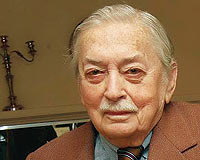
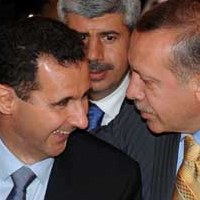

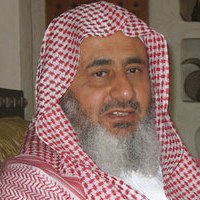
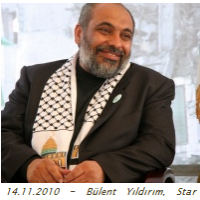
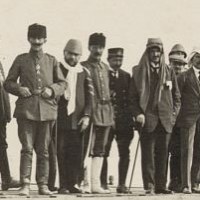




Bring Back The Caliphate – about islamism in #turkey http://j.mp/b6Arj3
RT @CrethiPlethi: Bring Back The Caliphate – about islamism in #turkey http://j.mp/b6Arj3
[…] This post was mentioned on Twitter by Elisabeth, Crethi Plethi. Crethi Plethi said: Bring Back The Caliphate – about islamism in #turkey http://j.mp/b6Arj3 […]
See the oustanding documentation AGHET made by Eric Friedler about the truth of the Armenian Genocide, with many proofs, long time hidden in order not to harm Turkey. The documentation was shown twice on two notable German TV stations in April this year and will be shown again in September. This is a very great sign as it’s a German production although it depicts the complicity of Germany (= Turkey’s Ally) in the Armenian Genocide.
PLEASE TAKE SOME TIME, WATCH IT AND SPREAD THE LINK.
––––––––––––––––––––––––––––––––––––––––––––––––––
http://www.youtube.com/view_play_list?p=B4306054D5680A18
––––––––––––––––––––––––––––––––––––––––––––––––––
THANK YOU.
Mustapha Kemal explains in his speech to the nation in 1927 why he abolished the Caliphate.
The misery, poverty , backwardness, darkness and primitivism of the most Mohemmedan nations for 11 centuries only partially be reversed in Turkey after Mustafa Kemal’s revolutions.
Here I let the great man speak, and let us know of his thought about the Caliphet.
Mustafa Kemal…
[……………..
I must call attention to the fact that Hodja Shukri Effendi, as well as the politicians who pushed forward his person and signature, had intended to substitute the sovereign bearing the title of Sultan or Padishah by a monarch with the title of Caliph.
The only difference was that, instead of speaking of a monarch of this or that country or nation, they now spoke of a monarch whose authority extended over a population of three hundred million souls belonging to manifold nations and dwelling in different continents of the world. Into the hands of this great monarch, whose authority was to extend over the whole of Islam, they placed as the only power that of the Turkish people, that is to say, only from 10 to 15 millions of these three hundred million subjects.
The monarch designated under the title of Caliph was to guide the affairs of these Mohamedan peoples and to secure the execution of the religious prescriptions which would best correspond to their worldly interests. He was to defend the rights of all Mohamedans and concentrate all the affairs of the Mohamedan world in his hands with effective authority.
The sovereign entitled Caliph was to maintain justice among the three hundred million Mohamedans on the terrestrial globe, to safe guard the rights of these peoples, to prevent any event that could encroach upon order and security, and confront every attack which the Mohamedans would be called upon to encounter from the side of other nations. It was to be part of his attributes to preserve by all means the welfare and spiritual development of Islam.
The absurd ideas which ignorant people like Shukri Hodja and his companions were disseminating about the actual condition prevailing in the world under the power of “religious prescriptions” with the intention of abusing our nation, are not worthy of being repeated here. In the course of centuries there have been people and there are still people to-day in the interior as well as in foreign countries who profited by the ignorance and fanaticism of the nations and try to make use of religion as a tool to help them in their political plans and personal interests. The fact that there are such individuals unfortunately compels us again to go into this question.
So long as the sentiments and knowledge of mankind with regard to religious questions are not yet freed from myths and purified in the light of true science, we shall find historians everywhere who play a religious comedy. We must actually belong to those “beings who live wholly in God,” like Shukri Hodja, not to be enlightened about the absurdities of the illogical ideas and impracticable prescriptions which they sow broadcast in all directions.
If the Caliph and Caliphate, as they maintained, were to be in vested with a dignity embracing the whole of Islam, ought they not to have realised in all justice that a crushing burden would be imposed on Turkey, on her existence; her entire resources and all her forces would be placed at the disposal of the Caliph?
According to their declarations, the Caliph-Monarch would have the right of jurisdiction over all Mohamedans and all Mohamedan countries, that is to say, over China, India, Afganisthan, Persia, Irak, Syria, Palestine, Hedjas, Yemen, Assyr, Egypt, Tripolis, Tunis, Al geria, Morocco, the Sudan.
It is well known that this Utopia has never been realised. The pamphlet itself signed by Hodja Shukri emphasises that the Mohamedan communities have always separated from one another under the influence of aims that were diametrically opposite to one another; that the Omayades of Andalusia, the Alides of Morocco, the Fatimides of Egypt and the Abbassides of Bagdad have each created a Caliphate, that is to say, a monarchy of their own.
In Andalusia there were even communities embracing a thousand souls, each of which was “a Commander of the Faithful and a Torch of Faith.” Would it have been logical or reasonable to pretend to be ignorant of this historic truth and to designate under the title of Caliph a ruler destined to govern all the Mohamedan States and nations, some of which were independent, while most of them were under a foreign protectorate?
Particularly the fact that a mere hand full of men consisting of the population of Turkey, burdened with the anxiety of supporting such a sovereign, would it not have been the surest means for strangling this people?
Those who say: The attributes of the Caliph are not of a spiritual kind,” and the basis of the Caliphate is material strength, the temporal power of the Government,” proved thereby that for them the Caliphate was the State.
And thereby it could easily be perceived that they pursued the aim of putting at the head of the Turkish Government some personality bearing the title of Caliph.
The attempts of Hodja Shukri Effendi and his political colleagues to conceal their political designs and to represent them under the form of a religious question which concerned the entire Mohamedan world had the only result that this puppet representing the Caliphate was still more speedily swept off the stage.
I made statements everywhere that were necessary to dispel the uncertainty and anxiety of the people concerning this question of the Caliphate.
I formerly declared: “We cannot allow any person, what ever his title may be, to interfere in questions relating to the destiny, activity and independence of the new State which our nation has now erected. The nation itself watches over the preservation and in dependence of the State which they have created, and will continue to do so for all time.”
I gave the people to understand that neither Turkey nor the handful of men she possesses could be placed at the disposal of the Caliph so that he might fulfill the mission attributed to him, namely, to found a State comprising the whole of Islam. The Turkish nation is incapable of undertaking such an irrational mission.
For centuries our nation was guided under the influence of these erroneous ideas. But what has been the result of it? Everywhere they have lost millions of men.
“Do you know,” I asked, “how many sons of Anatolia have perished in the scorching deserts of the Yemen? Do you know the losses we have suffered in holding Syria and the Irak and Egypt and in maintaining our position in Africa? And do you see what has come out of it? Do you know?”
Those who favor the idea of placing the means at the disposal of the Caliph to brave the whole world and the power to administer the affairs of the whole of Islam must not appeal to the population of Anatolia alone but to the great Mohamedan agglomerations which are eight or ten times as rich in men.
New Turkey, the people of New Turkey, have no reason to think of anything else but their own existence and their own welfare. She has nothing more to give away to others.
To enlighten the people on still another point, I employed these expressions:
Let us accept for a moment that Turkey would take this mission upon herself and would devote herself to the aim of uniting and leading the whole Islamic world and that she would succeed in achieving this aim.
Very good, but suppose these nations whom we want to subject and administer would say to us: You have rendered great services and assistance to us for which we are thankful to you, but we want to remain independent. We do not suffer any body else to interfere in our independence and sovereignty. We are capable of leading and administering ourselves.
In such a case will the efforts and sacrifices made by the people of Turkey result in anything more than earning thanks and a benediction?
It is evident they intended that the people of Turkey should be sacrificed to a mere caprice, to a fancy, to a phantom. To this effect the idea of attributing functions and authority to a Caliph and a
Caliphate can be comprehended.
I asked the people: Will Persia or Afganistan, which are Mohamedan States, recognize the authority of the Caliph in a single matter?
Can they do so?
No, and this is quite justifiable, because it would be in contradiction to the independence of the State, to the sovereignty of the people.
I also warned the people by saying that “the error of looking upon ourselves as masters of the world must cease.”
Let us put an end to the catastrophes into which the people had been dragged by following those who deceive themselves and misjudge our real rank and position in the world. We cannot conscientiously permit this tragedy to continue.
The English author Wells has written an historical work which was published two years ago. The last pages of this work contain some contemplations under the heading of “History of Mankind in the Future”.
These contemplations relate to the question of the establishment by the Governments of a World League.
In this chapter Wells develops his ideas as to the form the Government of a World League would take, and speaks about the essential fundamental lines of such a State. He depicts what might become of our earth under the Government of justice and a uniform law.
Wells says: “Unless all the sovereignties amalgamate into one single sovereignty, unless a higher power than nationalities appears, the world will perish,” and he continues as follows:
The real State could not be anything but the Government of the United States of the World, which are necessarily brought together by the conditions of modern life,” and “it is certain that sooner or later, men will be compelled to unite if they do not want to succumb under the weight of their own inventions.”
He also says that, “We do not know yet exactly what must be done and what must be prevented finally to attain the realization of the great thought of human solidarity,” and that a world federation of States will only succeed with difficulty in letting those powers join whose external policy has traditionally an aggressive character.
Let me also quote the following observations made by Wells: “The joint sufferings and needs of Europe and Asia will, perhaps, to a certain degree, contribute to bring the peoples of these two continents nearer to one another,” and “it is possible that a number of individual federations will precede the World Federation.”
I will by no means deny the beauty of the idea of the “United States of the World” the establishment of which would produce the result that the experience, knowledge and conceptions of mankind at large would be developed and uplifted, that mankind would abandon Christianity, Islam, Buddhism, and that a pure, spotless, simplified religion, understood by all and of a universal character, will be established, and that men will understand that they have lived hither to in a place of misery amidst disputes and ignominy, their desires and gross appetites, and that they will decide to eradicate all infectious germs which have hitherto empoisoned both body and soul.
In our midst also a conception partly equaling this plan has been formed for the purpose of satisfying the adherents of the Caliphate and a Panislam, on the condition, however, that it would not become
a source of difficulties for Turkey.
The theory put forward was this: “Mohamedan communities dwelling in Europe, Asia, Africa and in other regions, sooner or later in future will attain the liberty and faculty of acting according to their will and carry out their wishes.
And then, if they think it expedient and advantageous, they will find certain points of union and concord in accordance with the exigencies of the century.
Every State, every community undoubtedly has needs that could be satisfied and protected by other States and communities; the
States have reciprocal interests.
If the delegates of these hypothetical independent Mohamedan States would unite in a congress and declare that this or that relation ship has been established between certain States, that a committee had been formed for the purpose of maintaining such mutual relations and securing joint action under the conditions established by these relations that the Mohamedan States united in this manner would be represented by the president of this committee, then they will, if so desired, give to these United States of Islam the title of Caliphate and to the person elected to be president of this united assembly the title of Caliph.
But neither common sense nor reason will ever admit that any individual Mohamedan State will confer on any man the authority of guiding and administering the affairs of the whole of the Mohamedan world.
Mustafa Kemal analyses his views on the thoughts of involving religion and the Caliphate in the state administration.
Constitution Act, during the course of long meetings and consultations with journalists from Ismidt and Constantinople, one of my inter wiewers at Ismidt put the following question: “Will the new State have a religion?”
I must confess that it was most undesirable that I should have to answer this question, because, in the circumstances then prevailing,
I did not wish to be compelled to give an answer which was evident incidentally, a very short one.
If a State having amongst its subjects elements professing different religions and being compelled to act justly and impartially towards all of them and allowing justice to prevail in its tribunals equally towards foreigners as well as its own subjects, it is obliged to respect freedom of opinion and conscience. It is surely not justified in making restrictions in this natural authority of the State by attributing other qualities to it which are capable of having an ambiguous meaning.
When we say that “the official language of the State is Turkish,” everybody understands what this means; everybody understands that it is natural that the Turkish language should be used in official affairs. But will the sentence “The State religion of Turkey is the Mohamedan religion” be accepted and understood in the same way?
It must naturally be criticized and explained.
I could not answer the question put to me by the journalist, my interviewer, with: “The State cannot have a religion.” On the contrary, I answered: “It has one the Mohamedan religion.”
I immediately felt the need of commenting on and qualifying my answer by the following sentence: “The Mohamedan religion includes the freedom of religious opinion.”
Thereby I wanted to express that the State is obliged to respect freedom of opinion and freedom of conscience.
Undoubtedly my interviewer did not find my reply reasonable and repeated his question in the following form: “Did you mean to say that the State will identify itself with a particular religion?”
“I do not know,” I said, “whether this will be the case or not.” I wanted to end the debate, but this was not possible. “Then,” they told me, “the State will prevent me from expressing an opinion that corresponds to my views and thoughts on any question. And if the case should arise I shall be punished for having done so.” “But will everybody discover a way to silence his conscience?”
At that time I was thinking of two things. The first was: Will not every grown up person in the new Turkish State be free to select his own religion?
Then I recalled Hodja Shukri s proposal which was: “Some of my colleagues among the Ulema as well as myself, consider it to be our duty to publish our common thoughts, as well the prescriptions of Islam, which are confirmed and set forth in the books of the Sheri . . . to enlighten the minds of the Mohamedans, which have unfortunately been led astray.”
I also recalled the following sentence: “The Caliphate of Islam has been entrusted by the Prophet to protect and perpetuate the religious prescriptions and to be the representative of the Prophet in the exercise of the Sheriade.”
But to quote the words of the Hodja would be equivalent to an attempt to abolish the national sovereignty.
But, on the other hand, we had not to consider the bulk of the knowledge of the Hodjas comprised in formulae which had been dictated in the time of Caliph Yesid* and which had been appropriated to a regime of absolutism.
Consequently, who would be deceived if the expressions “State” and “Government” were enwrapped in the cloak of religion and the Sheriade? Although the meaning of these expressions, as well as of the authorities of the Assembly, are now clear to everybody, what need is there for this deception?
Mustafa Kemal is asked to be the Caliph.
“the Mohamedans in the countries through which he had been travelling demanded that I should become Caliph, and that the competent Mohamedan bodies had commissioned him to inform me of this desire.”
“…………Certain persons who wrongly believed that it was necessary, for religious and political reasons to maintain the Caliphate, proposed at the last moment when the decisions were to be taken, that I should assume the office of the Caliphate.
I immediately gave a negative reply to these men.
Let me emphasize another point which arose: When the Grand National Assembly had abolished the Caliphate, Rassih Effendi, an ecclesiastic and deputy for Adalia, was president of the deputation of the Red Half-Moon, which was in India.
He came back to Angora via Egypt. After soliciting an interview with me, he made statements to the effect that “the Mohamedans in the countries through which he had been travelling demanded that I should become Caliph, and that the competent Mohamedan bodies had commissioned him to inform me of this desire.”
In the reply which I gave to Rassih Effendi, I expressed my thanks for the benevolence and affection which the Mohamedans had shown me and said: “You are a Doctor of Religious Right. You know that Caliph signifies Chief of the State. How can I accept the proposals and desires of people who are governed by kings and emperors?
If I should declare myself ready to accept this office, would the sovereigns of those people consent to it?
The orders of the Caliph must be obeyed and his interdictions submitted to.
Are those who want to make me Caliph in a position to execute my orders?
Consequently, would it not be ridiculous to rig me up with an illusionary role which has neither sense nor right of existence?”
Gentlemen, I must frankly and categorically declare that those who continue to occupy themselves with the chimera of the Caliphate and thereby mislead the Mohamedan world, are nothing but enemies of the Mohamedan world, and especially of Turkey.
They are only ignorant or blind men who could attach hopes to such jugglery.
Is it from love of our faith that such people as Rauf Bey, Tsher- kess Edhem and Reshid, all the “Hundred and Fifty”*), all members of the deposed dynasty of the Sultanate and the Caliphate with their adherents, all enemies of Turkey, are working with so much bitterness?
Is the aim of those who are working so energetically against us, sheltering themselves under the words “holy revolution,” but who use means such as murderous attempts, and gangs of brigands, and who maintain organization centers at our frontiers, who have always made the destruction of Turkey their aim is this aim actually a holy one?
Indeed, to believe this would mean that we were possessed of unmitigated ignorance and boundless blindness.
From now onwards it will not be so easy to suppose that the Mohamedan peoples and the Turkish nation would have fallen to such a low level as to continue in the abuse of the purity of the con science and the tenderness of the sentiments of the Mohamedan world to criminal aims. Impudence has its limits……”
……]